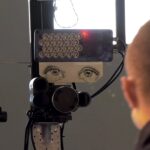US Customs and Border Protection is further expanding its use of biometric border screening at sea ports. The agency has announced that, through a partnership with Carnival Cruise Line, it is now scanning faces as part of the debarkation process at the Port of Mobile, Alabama.
The CBP’s announcement made no mention of ‘Simplified Arrival’, the face-scanning border control program that has proliferated across American airports in recent years, but the Port of Mobile deployment can be seen as a further expansion of the CBP’s overarching biometric border control project. The modus operandi is essentially the same: a traveler – in this case, an individual disembarking at the Port – is subjected to a face scan, with the biometrics matched against their passport or visa photo in Department of Homeland Security records in order to verify their identity. Failure to match prompts further scrutiny, while a successful match clears the way for the traveler to proceed.
While airports have been the main sites of deployment for the CBP’s biometric program, the agency has also brought it to numerous land and sea ports. As far back as 2017, the CBP was exploring the scanning of cruise line travelers in collaboration with IDEMIA and Royal Caribbean Cruises, and the CBP now says that it has deployed biometric face-scanning technology at 13 seaports.
“As we prepare for the increase in cruise travel around our nation’s ports, CBP is working closely with the cruise industry to make travel safer and more efficient, while also supporting travel recovery efforts,” explained Steven Stavinoha, the Field Operations Director of the CBP’s Gulf Coast Field Office. “The biometric facial comparison process adds an extra layer of security and streamlines travel into the United States by replacing the manual inspection of travel documents with a secure, touchless process.”
The SBP says that over 146 million travelers have been processed through its biometric face scanning program to date across air, land, and sea ports; and that it has helped the agency to detect over 1,300 impostors. The agency says that the technology it uses is 98 percent accurate and can verify an individual’s identity within two seconds.
The CBP’s biometric border control program does have its critics, including privacy advocates like the ACLU as well as elected lawmakers who have concerns about privacy and civil rights. Earlier this year, Senators Jeff Merkley (D-OR) and Roy Blunt (R-MO) sent a letter to CBP Commissioner Chris Magnus asking for detailed information about the steps his agency is taking to inform the public about its biometric data collection practices.
–
Mar. 28, 2022 – by Alex Perala









Follow Us